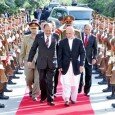By Faisal Raza Khan –
It was the summer of 2010, when a number of bugs infiltrated Iranian nuclear facility at Natanz, and it was believed that those cyber-worms called ‘Stuxnet’ destroyed one-fifth of the Iranian centrifuge system at the facility. Iranian authorities blamed the United States and Israel for initiating such a cyber attack. While both US and Israel initially denied the accusation, they acknowledged afterwards that through window’s operating system and online data transmission, this worm had infected even desktop computers and laptops in India, Indonesia, Pakistan, Azerbaijan, United States itself and some other nations.
The programme, part of the United States Foreign Intelligence Surveillance Act (FISA), collects electronic communications, including telephone calls and emails, where the target is primarily located outside the United States.
Three years later, in 2013, a former systems administrator at Central Intelligence Agency (CIA), a counter-intelligence trainer of the Defense Intelligence Agency (DIA), later cyber expert at National Security Agency (NSA), Edward Snowden, got international fame when he leaked that the NSA is running a global internet and phone surveillance/spying program and every country is under the US spy-eye. This sparked a wave of concern among all major countries but Pakistan seemed reluctant to beef up cyber security measures at either its sensitive installations or to secure its people, who are now vulnerable because their civil rights and privacy is at stake.
“Cyber security is an important issue and a serious threat to every country, without cyber protection, Pakistan’s security will permanently be at stake. My party is cognizant of this,” said Pakistan People’s Party’s senior leader, Senator Farhatullah Babar, seemingly concerned over US surveillance in Pakistan.
Recently, Snowden’s leaked information was revealed in Greenwald’s book titled ‘No Place to Hide’, which says NSA objective was to ‘collect, process, exploit, partner, sniff and know it all’, meaning the programme that developed under US former president George W. Bush and expanded in president Barrack Obama’s tenure, made US a ‘Cyber Super-Power’ and breached all norms of civil and human rights.
“There is a huge difference between legal programmes, legitimate spying and programmes of dragnet mass surveillance that put entire populations under an all-seeing eye and save copies forever. These programs were never about terrorism, they’re about economic spying, social control and diplomatic manipulation. They’re about power,” Snowden said in a letter written on December 2013 and addressed to the Brazilian people.
An executive board member of ‘Bolo Bhi’, a group that is proactively working on internet access, digital security and privacy, award winning activist and blogger, Sana Saleem told Pique that the US is gravely violating UN conventions by conducting global surveillance, including in Pakistan where Islamabad is already sharing relevant security information with Washington after the September 9/11 attacks.
Pakistan is under a US intelligence programme worth around $52.6 billion, from nuclear weapons, defence deals, cargoes/shipments, flight details, bank transactions, workings of state bank or stock exchange, human rights abuses, extra-judicial killings to every single individual’s e-mails, conversations, videos and others private data. Most analysts believe that initial information about Osama Bin Laden’s presence in Pakistan was retrieved through different e-mails initiated from Al-Qaeda militants from Pakistan.
Lets suppose, a bug enters via internet into a computer system, grabs one’s personal information, makes up a criminal case and gives a fare chance to law enforcement authorities to break into one’s home to arrest and put the individual behind bars in the name of national security, what would he or she do then? Such a scenario certainly strikes like a thunderbolt but it might be more shocking when there would be no law to protect against it.
In support of the Pique investigation, legislatures acknowledge there is no active law on cyber-war/ attack/terrorism or any provision available in existing laws in the country, only recently chairman senate standing committee on defence, Senator Mushahid Hussain Syed introduced ‘National Cyber Security Council Bill – 2014’, and right now its under debate, stressing urgent measures to protect against surveillance and spying activities by foreign intelligence agencies.
“Yes, right now, there is no legislation available, cyber warfare or terrorism is more than a conventional or non-conventional threat, we have moved a private member bill and besides public hearings, senate committee on defence has also taken various initiatives on this aspect. Today’s challenges demand the government’s urgent focus and swift appropriate measures,” Senator Babar added.
Sana Saleem elaborated that parliamentarians are only considering cyber-warfare a threat but that’s only one aspect, protection of citizen’s rights, security and privacy through effective legislation is more important.
“At this point in time, the introduced legislation demands responsibilities of individuals but lacks protection of their rights, is silent on their security and not a single word is mentioned with regards to privacy, there should be an urgent need to introduce a right based legislation or an amendment in the Pakistan Telecommunication Authority (PTA) act, Pakistan Protection Act 2014, Fair Trial Act etc. judicial capacity building is also need in Cyber Security paradigm,” she explained.
If people don’t have the right to live, speak, share thoughts, information, moments of joy independently and autonomously, then what would cyber laws be good for? It’s a new century and an entirely new way of electronic colonialism through weapons of online destruction of human values and sanctity.
It was just in 2012, when the United Nation’s Human Rights Council unanimously adopted a resolution 20/8, which, “Affirms that the same rights that people have offline must also be protected online, in particular freedom of expression”.
UN Special Reporter on Freedom of Expression, Mr. Frank La Rue, reported worrying new trends in state surveillance of communications with serious implications for the exercise of human rights to privacy and freedom of opinion and expression while he noted that inadequate and non-existent legal frameworks, “Create a fertile ground for arbitrary and unlawful infringements of the right to privacy in communications and, consequently, also threaten the protection of the right to freedom of opinion and expression”.
International and US civil society organizations and US based internet companies with global outreach not only strongly protested and expressed deep concerns over revelations of internet and telephone communications surveillance, but also termed this move a deliberate and methodical disregard for human rights as articulated in the International Covenant on Civil and Political Rights (ICCPR) and Universal Declaration of Human Rights.
In 2013 last year, Pakistan witnessed a successful transformation of power from one democratically elected government to another, people have elected a democracy for the protection of their due fundamental rights but, so far, the US is breaching people’s rights and freely doing internet profiling within Pakistan, and no concrete steps have been taken by the people representatives sitting at the treasury benches.
An important question arises here, how can a government forcefully raise the issues pertaining to cyberspace, digital security and surveillance against the US administration, when YouTube is still blocked, off and on closures of Viber, Facebook and other interactive internet tools is a regular feature while reportedly, the government itself is installing Chinese versions of monitoring online content and internet filtration.
The writer is a journalist based in Islamabad































































































